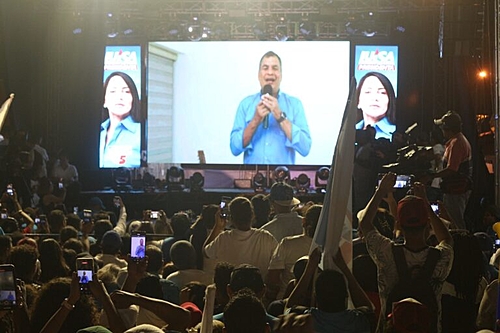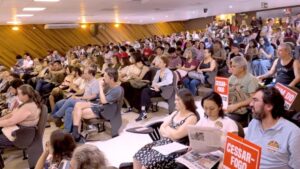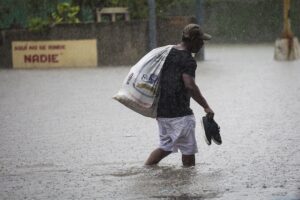
In the last six years, since the end of Rafael Correa’s second term (2017), Ecuador has witnessed an unprecedented escalation of violence sponsored by organized crime represented primarily by drug trafficking, which currently also controls penitentiaries.
According to former deputy Jhajaira Urresti, interviewed by ComunicaSul, from the government of Guillermo Lasso, “our country is beginning to see these waves of drug trafficking introduced not only through the seas, on the Ecuadorian coasts, but also in our neighborhoods. , in our capitals, in our cities”.
::Ecuador: the final stretch of the presidential race is a challenge for left-wing candidate Luisa González::
The statement is confirmed by judge and activist Rosa Salazar, from the International Democratic Federation of Women: “Lasso arrived and we don’t know if we have a government or not, because he didn’t do anything. The mafias appeared with more force and today they are institutionalized”.
Organized crime already existed, as in Europe and elsewhere, Rafael Correa said via internet at the closing rally of Luisa González’s campaign on Thursday (17). The big difference, explained Correa, is that now he has infiltrated the State, the government. “There is narcopolitics in the government. Drug trafficking has infiltrated the security forces, senior officers, the armed forces of the National Police,” he denounced.
“Today, it is impossible to ignore the fact that corruption and the infiltration of organized crime in the state have come together. There is an ‘informal’ or ‘illegal’ force of power that is taking precedence over formal power,” added Ecuadorian historian Juan Paz y Miño Cepeda in the same vein.
According to surveys, violence is now the main concern of Ecuadorians and has become the favorite subject of the campaigns of all candidates. The problem is so serious that Correa spent a good part of his speech at the rally talking about what to do to face the criminals.
For the former president, currently exiled in Belgium, the fight against drug trafficking must be faced not only with weapons, but with efficient action by the intelligence services to discover the structure of the mafias. “We know that when a traffic lieutenant is arrested, he is immediately replaced and the violence continues. Then they must all be arrested so that the gang can be completely dismantled. The intelligence services must find out how money circulates and how crime is financed, how they obtain more and more heavy weapons, where and how drugs move,” Correa said.
Ecuador has now become Europe’s main supplier of cocaine, without producing a single gram. The cocaine “exported” by the country comes from neighboring Colombia, by sea or through the jungle, and is smuggled to Europeans through Ecuadorian ports. To combat this transnational organized crime, Correa advocated international coordination. “We have to coordinate with Colombia and with the ports of destination”, he maintained, adding that “we had, for example, the binational border commissions and we coordinated with Colombia the fight against drug trafficking. Where they couldn’t go, we arrived. And we must also coordinate internationally with Europe and the United States”. All institutional mechanisms to combat drug trafficking organized during the period of the Citizens’ Revolution were dismantled by the Lasso government, accuses Correa, and urgently need to be rebuilt.
::Ecuador: the public security crisis and the murder of Villavicencio::
“This is a narco state, a government that is close to organized crime. Does anyone believe this government’s investigations into the recent murder of Fernando Villavicencio? He denounced narco-generals, or narco-generals. Did they shut him up?” asked Rosa Salazar.
Another serious problem in Ecuador is that drug traffickers have taken over the country’s penitentiaries and turned them into true operation centers for organized crime. “In prisons, criminals have high-caliber weapons, appliances, all the benefits,” denounced Judge Salazar. “We have to intervene in penitentiaries so that they are no longer run by organized crime and this intervention must be profound”, added Jhajaira Urresti.
We want them to purge the military leadership, to purge the National Police leadership, all institutions that are full of corrupt people, says the judge. For this, Rafael Correa even defends the use of a polygraph [vulgarmente conhecido como detector de mentiras] as members of public security institutions must pass tests of trust. And there will be some who will not pass, concludes the former president.
Source: www.brasildefato.com.br

